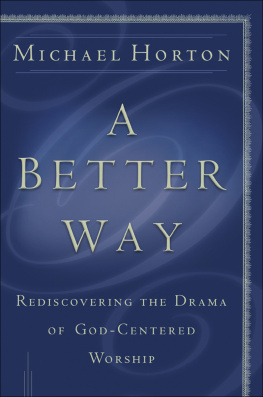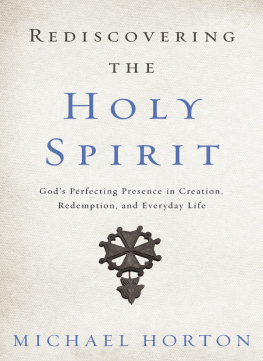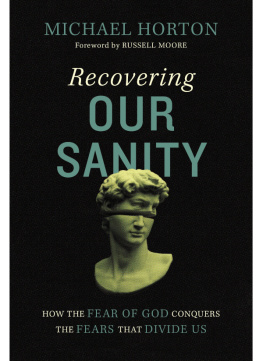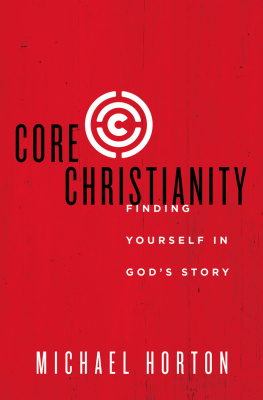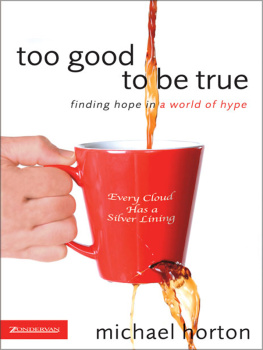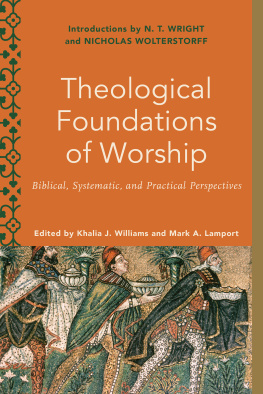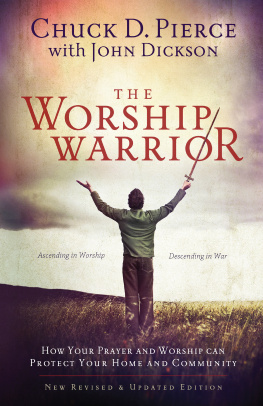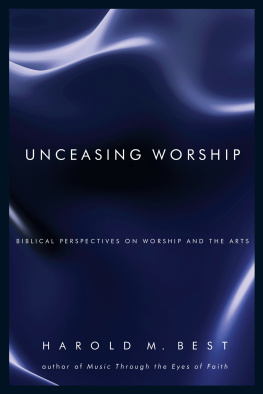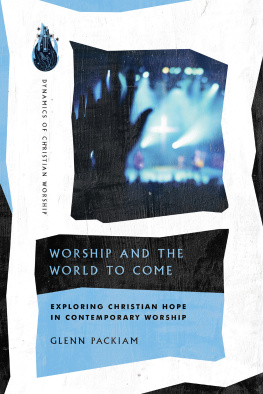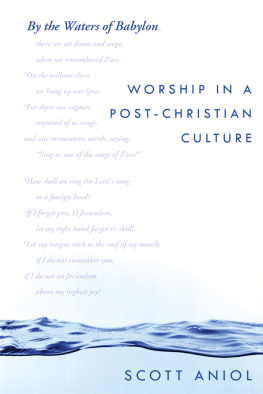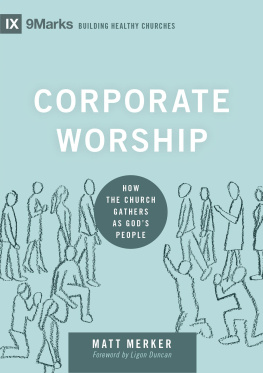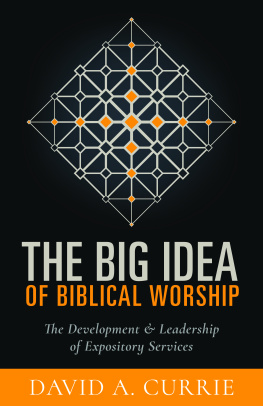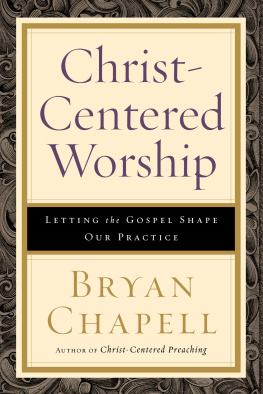Michael Horton - A Better Way: Rediscovering the Drama of God-Centered Worship
Here you can read online Michael Horton - A Better Way: Rediscovering the Drama of God-Centered Worship full text of the book (entire story) in english for free. Download pdf and epub, get meaning, cover and reviews about this ebook. year: 2003, publisher: Baker Publishing Group, genre: Religion. Description of the work, (preface) as well as reviews are available. Best literature library LitArk.com created for fans of good reading and offers a wide selection of genres:
Romance novel
Science fiction
Adventure
Detective
Science
History
Home and family
Prose
Art
Politics
Computer
Non-fiction
Religion
Business
Children
Humor
Choose a favorite category and find really read worthwhile books. Enjoy immersion in the world of imagination, feel the emotions of the characters or learn something new for yourself, make an fascinating discovery.
- Book:A Better Way: Rediscovering the Drama of God-Centered Worship
- Author:
- Publisher:Baker Publishing Group
- Genre:
- Year:2003
- Rating:5 / 5
- Favourites:Add to favourites
- Your mark:
- 100
- 1
- 2
- 3
- 4
- 5
A Better Way: Rediscovering the Drama of God-Centered Worship: summary, description and annotation
We offer to read an annotation, description, summary or preface (depends on what the author of the book "A Better Way: Rediscovering the Drama of God-Centered Worship" wrote himself). If you haven't found the necessary information about the book — write in the comments, we will try to find it.
A Better Way: Rediscovering the Drama of God-Centered Worship — read online for free the complete book (whole text) full work
Below is the text of the book, divided by pages. System saving the place of the last page read, allows you to conveniently read the book "A Better Way: Rediscovering the Drama of God-Centered Worship" online for free, without having to search again every time where you left off. Put a bookmark, and you can go to the page where you finished reading at any time.
Font size:
Interval:
Bookmark:
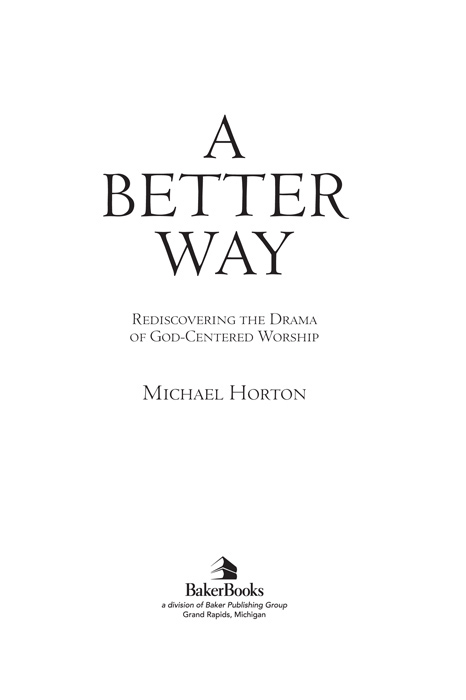
2002 by Michael Horton
Published by Baker Books
a division of Baker Publishing Group
P.O. Box 6287, Grand Rapids, MI 49516-6287
www.bakerbooks.com
Ebook edition created 2011
All rights reserved. No part of this publication may be reproduced, stored in a retrieval system, or transmitted in any form or by any meansfor example, electronic, photocopy, recordingwithout the prior written permission of the publisher. The only exception is brief quotations in printed reviews.
ISBN 978-1-5855-8503-8
Library of Congress Cataloging-in-Publication Data is on file at the Library of Congress, Washington, DC.
Unless otherwise indicated, Scripture quotations are from the Holy Bible, New International Version. NIV. Copyright 1973, 1978, 1984 by Biblica, Inc. Used by permission of Zondervan. All rights reserved worldwide. www.zondervan.com
Scripture quotations identified NKJV are from the New King James Version. Copyright 1979, 1980, 1982 by Thomas Nelson, Inc. Used by permission. All rights reserved.
Scripture quotations identified NRSV are from the New Revised Standard Version of the Bible, copyright 1989 by the Division of Christian Education of the National Council of the Churches of Christ in the USA. Used by permission.
To the Lamb upon the throne,
in memory of James Montgomery Boice
mentor, partner, and friend
Contents
Acknowledgments
There are too many people to thank for whatever might be useful in this volume. Besides, most of them are quite nice people, and I would not want to diminish their credibility by association with my ruminations. However, a few names must be mentioned.
First, thanks to all the people who asked me to write this book, many of whom sent articles that were quite helpful in preparation. Especially to be thanked along these lines are Christ Reformed Church (URC), Anaheim, and Dr. Kim Riddlebarger. Ive also learned a great deal about worship from my interaction over the years with Dr. Rod Rosenbladt and Rev. Kenneth Jones. Second, thanks to the students at Westminster Theological Seminary in California for letting me try out some of this material on them. Im grateful also to Eric Landry for his enormous assistance, as well as that of Steve Moulson. Third, I would like to express appreciation to Baker Book House and particularly to Donald Stephenson and Rodney Clapp.
Saving the best for last, thanks to my wife, Lisa, for putting up with me during the writing and for taking such an active interest in reading and editing the first draft.
INTRODUCTION
A Glorious Theater
The premise of this book is that stated so eloquently by the mid-twentieth-century mystery novelist Dorothy Sayers:
Official Christianity, of late years, has been having what is known as a bad press. We are constantly assured that the churches are empty because preachers insist too much upon doctrinedull dogma, as people call it. The fact is the precise opposite. It is the neglect of dogma that makes for dullness. The Christian faith is the most exciting drama that ever staggered the imagination of manand the dogma is the drama.[]
After briefly recapitulating the plot of Scripture as it unites around the person of Christ, Sayers concludes:
Now, we may call that doctrine exhilarating or we may call it devastating; we may call it revelation or we may call it rubbish; but if we can call it dull, then words have no meaning at all. That God should play the tyrant over man is a dismal story of unrelieved oppression; that man should play the tyrant over man is the usual dreary record of human futility; but that man should play the tyrant over God and find Him a better man than himself is an astonishing drama indeed.[]
Across the spectrumliberal and conservative, Reformed, Lutheran, Baptist, Roman Catholic, and Pentecostalthere seems to be a general vagueness about the God we worship and the purpose of worship in the first place. But do we have to settle for either dull routine or perpetual innovation? It is part of this books burden to demonstrate that there is a better way.
For some reasonmany, actuallypreaching today has lost its nerve. And so has worship in general, along with its effects: missions, evangelism, and diaconal care. On one hand, some approaches to ministry these days reduce the Lords Day to a lecture; everything else in the service is thrown together, almost randomly on occasion. And if worship is reduced to the sermon, the sermon is often reduced to an exercise in doctrinal and moral exhortation and assent. Others, understandably reacting against this barren intellectualism or moralism, have not only recognized the importance of other aspects of the service (especially heartfelt singing) but have increasingly turned preaching itself into a form of entertainment and emotional expressiveness. Further, whereas the reading material of pastors, elders, church musicians, and informed laypeople used to be quite serious theology, todays bibliographies include, in ranking order, marketing studies of the unchurched, pop psychology, practical management guides by successful CEOs, and peculiar end-times novels. Into this arena come the so-called worship wars, with both sides amassing their proof-texts that supposedly settle the debate once and for all, resulting in a tragic division of Christs body into traditionalist and progressive camps, each with its own Sunday morning service.
There could hardly be a more polarized moment concerning the issues before us. In all of this, however, there does not seem to be enough discussion of the deeper issuesthe biblical and theological issuesunderlying a distinctively Christian view of worship. With notable exceptions, such as Marva Dawns Reaching Out without Dumbing Down and A Royal Waste of Time , there has been a dearth of approaches that move beyond this traditional-contemporary impasse. To be sure, a number of practical books on preaching and music are readily available. But these generally advocate a balancing act between traditional and contemporary styles, a balancing act undergirded by more politics and pragmatism than serious biblical and theological reflection. All of this serves to substantiate the prevailing assumption that how we worship is simply a matter of style, not substancenever mind the second commandment, which prescribes not only whom we worship but how he wants to be worshiped. It seems to me that we need to take a step back and say, Wait a minute. What is worship anyway? Why do we do it? How do we know when were doing the right thing? In both traditional and contemporary camps, there appear to be numerous assumptions that are never spelled out, and they are usually compelling only to those who already hold them.
There are signs that this is a great time to take a step back and ask some deeper questions than whether we should allow guitars in worship. Both sides in the so-called worship wars have had enough time now to figure out that there are more important questions and are eager to come to some consensus that will stem the tide of division over this issue. As ]
Ironically, the same pragmatic marketing criteria are being used to move away from seeker-driven shallowness. The unchurched, especially the younger crowd, are burned out on hype. That makes Soul Purpose [the singles ministry] probably the most ecclesiastical ministry in our very non-traditional church.[] Rich Hurst, the other expert interviewed, says of these changes:
I have a whole different view of ministry. Im still stuck in a seeker mode and Im trying to get out of it. Thats a big problem with our church world. I find it difficult to say anything positive about the church growth movement. In 1970 there were 10 megachurches, today there are over 400, and yet overall church attendance is off 35 percent. I was in Chicago recently with some pastors. I used to be on the pastoral staff of a seeker church, so I have a pretty good working knowledge of that kind of ministry and what it takes to raise a lot of money. I dont think they have much of a future; theyll wind up being tourist attractions or community colleges because they havent learned how to reach the next generation. The idea of seeker worship hasnt been the answer to what ails Christianity in America.[]
Next pageFont size:
Interval:
Bookmark:
Similar books «A Better Way: Rediscovering the Drama of God-Centered Worship»
Look at similar books to A Better Way: Rediscovering the Drama of God-Centered Worship. We have selected literature similar in name and meaning in the hope of providing readers with more options to find new, interesting, not yet read works.
Discussion, reviews of the book A Better Way: Rediscovering the Drama of God-Centered Worship and just readers' own opinions. Leave your comments, write what you think about the work, its meaning or the main characters. Specify what exactly you liked and what you didn't like, and why you think so.

